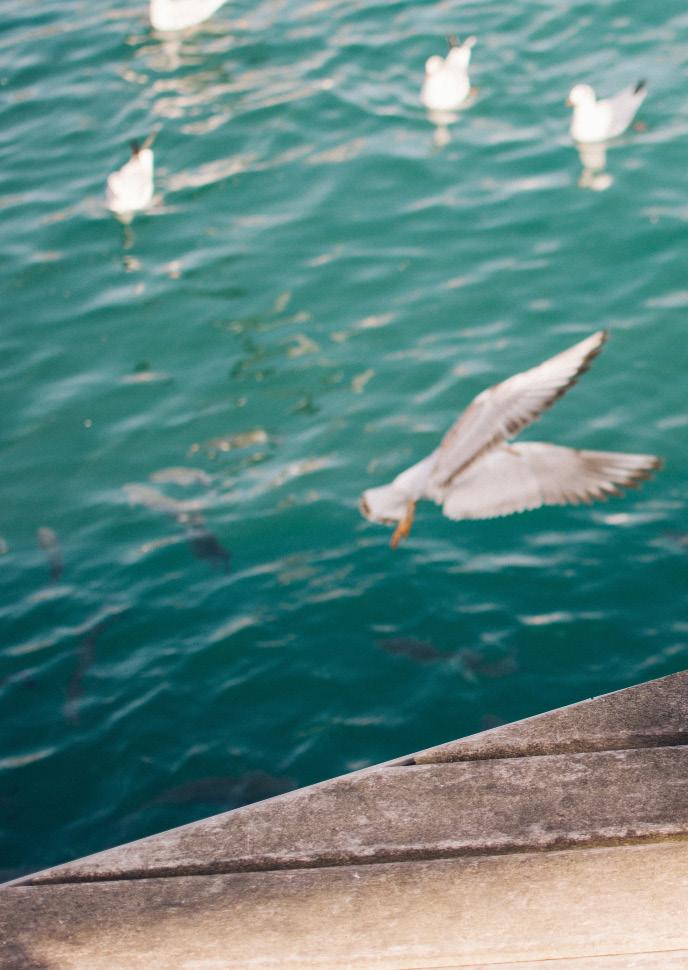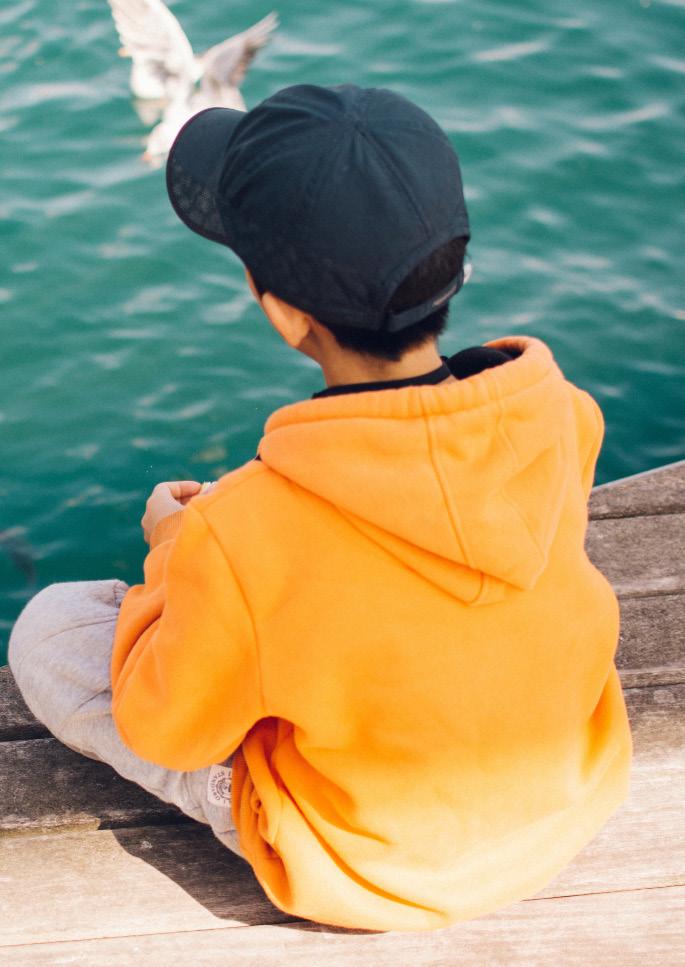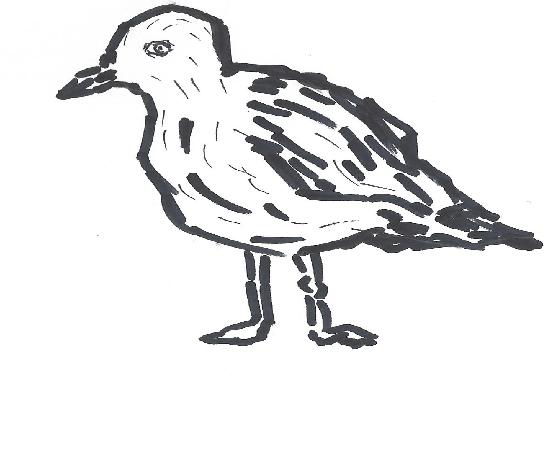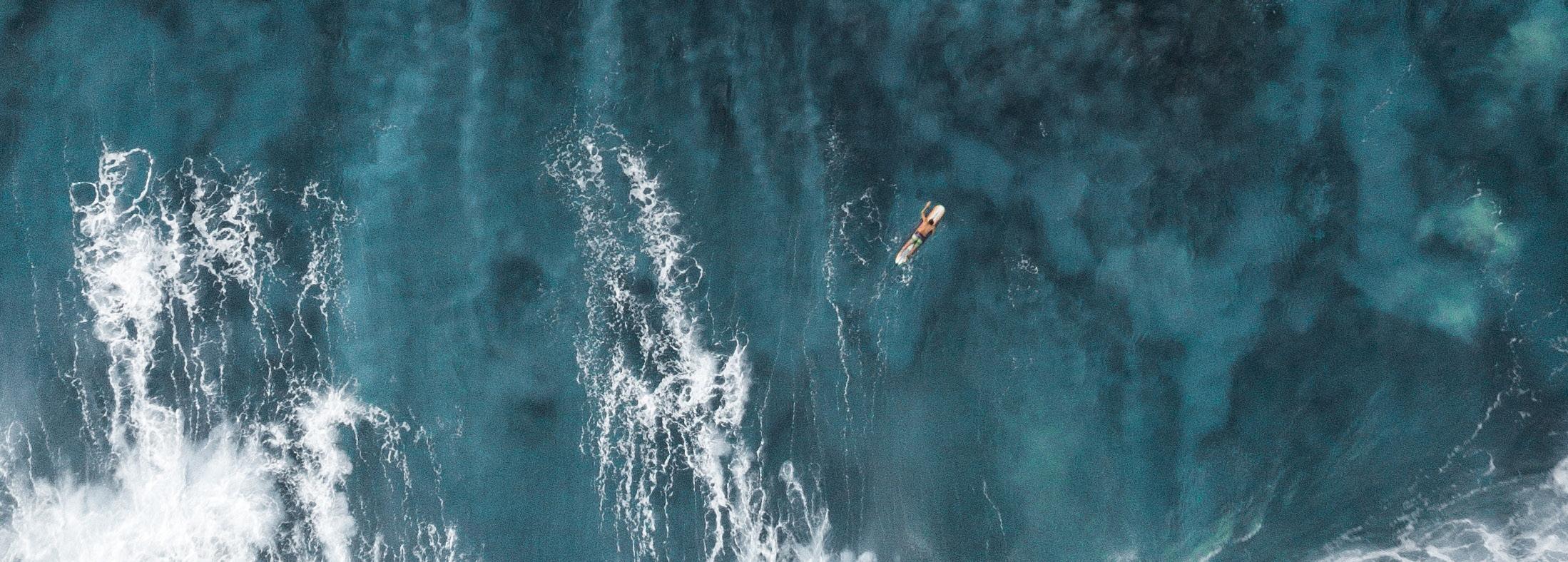
7 minute read
Soaring with Seagulls
Yoshua Selvadurai - University of New South Wales (IV)
The roar of the highway outside our Fitzroy apartment sounds like the ocean I once knew. In the mornings as I walk down the narrow staircase to go to school, I like to pretend that I am about to step onto that same Smithton Beach. I can feel the warm coarseness of the sand, and hear the frothy crash of the waves. And although I know this is just a silly game, it is always a bit of a shock to crack open the rusty door and confront the metallic rush of the highway. Peeling billboards instead of fluttering seagulls, high-voltage power poles instead of sinuous gums trees, and a chain of nudging cars where the arcing surf should be collapsing onto the beach.
Advertisement
Waldy and I used to ride our bikes under the endless skies of Tasmania, laughing at seagulls being blown off course by the Bass Strait winds. Crouched on an isolated promontory in north-western Tasmania, the small fishing village of Smithton faces the brunt of the wild ocean gales. Sometimes, we used to kayak out on the glacial swell beyond the headlands. Sometimes, we’d let down a few crayfish pots and fry our catch on a Council BBQ. Waldy and I were no fishermen but we managed. Not sure what we were really.
We had a policy of not doing much. Most of the time, we’d ride around the deserted foreshore, muck around the fossil-veined rocks and disrupt the polished surface of the water with our skimming stones.
Waldy and I were both thirteen, but Waldy was massive, well over 6 feet, always nattering excitedly about some footy ref’s decision, and wearing the same red flannelette shirt. There was nothing remarkable about me. Eyes the colour of clear plastic, hair the colour of potatoes, average height. At least that’s how my sister Laura described me in her journal. I found it under her bed after she went off to study on the Mainland. Timmy, my old Jack Russell, still hung with us though. He couldn’t run as fast as he used to, but he still scampered a few metres ahead, pausing every so often to look over his shoulder to check that he had got our trajectory right. I reckon our wonderland there was better than the one shown in those Gold Coast brochures.
All I ever wanted to do was gaze at the drifting seagulls, until their flight ached in my shoulders and the sun slipped behind the distant dunes. The house was pretty quiet now. I think Dad took up extra shifts at the paper mill just to get away from all that quietness lurking around at home. Even Mr Mendez from next door was not around anymore. But outside was a carefree place where nothing sad could ever happen. The strong voices of the trees in the wind and the crash of the surf made talk unnecessary. Maybe it was the way the trees embraced you with their cool shade or the way evening fell so softly, gently shifting from pink to mauve to indigo, that it made you feel nature was gentle, even kind.

But Waldy was full of half-baked plans for conquering the place. If we uncovered a cave, he wanted to crawl through its darkest crevice, if we found a dune, he wanted to discover its powdery zenith. So when we found an old tinnie by the side of the Surf Club, Waldy went nuts.
“Let’s give it a burl! Beyond ‘em breakers. I’ve heard there’re oyster beds out there.”
“But there are rocks.” I ventured. “And currents.”
“Noah, you’re such a wimp mate! Maybe it’s because your mum and old Mendez…”

Waldy began in a frenzy of flapping hands. I stopped him right there.
“We’ll go.” I looked again at the tinnie, it looked a bit like a toy boat that I once had, its jaunty orange trim promising escape. Agreeing to meet after our folks went to sleep, we cycled back to our homes to await the night.
Waldy was already there when I got back. We waited until the chalky moon emerged from behind the clouds, then pushed the toy boat into the water.
I scanned for rocks.
Drowned daggers. Shards of basalt. I knew they lurked below.


Unfazed, Waldy sliced the tinnie through the waves, guffawing as we flew past the cliff’s jagged edge. Below us, submerged rocks glistened like cursed relics from an ancient civilisation. I wanted to tell him to be careful but I reckon I’d have sounded like my dad. Waldy cut the engine, and we slid up to the silent swaying oyster beds.
I climbed onto the ledge to pull us closer but as I stood on the tinnie’s narrow lip, I slipped on its dewy steel and lost my balance, stumbling head first into the water. For a moment, it was quiet, real quiet under there. Still. Peaceful even. Soft ribbons of seaweed threaded my hair. Cool fingers of currents curled around my body. Above me, the moon lay dissolved, gently floating on the shifting surface of the water.
That serenity did not last for long, it was replaced by a leaden weight in my lungs that made me want to scream and shout for air. I clawed towards that pale orb, but even as I flailed, I sank back, deeper into the darkness where the moon could not follow. Instinctively, I reached for the arms that were coming to hold me from beneath. This was the moment, when the buoyancy drained from my body, when I thought I was going down, but then the arms came and lifted me above the waters.
I felt my body grow limp, reliving the shock, feeling tremors so deep that I did not even shake. I once heard one of the Smithton lifeguards say that swimmers in distress are different to drowning people. Swimmers in distress flail about and shout and carry on, but drowning people can go unnoticed. In that moment, I guess I was a drowning person, slipping unnoticed towards the ocean floor. But as I gave up, I felt my body start to slowly drift up. The dissolved moon grew larger and larger until I shattered the glassy ceiling and emerged gasping for air. Watching out for me, Waldy reached over and grabbed my arm, hauling me over the side of the tinnie and sending me crashing onto its metal floor. As I lay heaving on the cold steel, I could see the dim silhouette of the petrel birds flying peacefully in the night air.
Quiet for once, Waldy cranked up the engine and muscled the tinnie home. Waiting on the wharf, my dad and Mr and Mrs Waldhauser willed us to land with the silent intensity of their gazes. That night as Dad drove me home, he shook his head and muttered, “It’s no good you gadding about this place, getting into trouble because there’s nothing to do.” Then throwing an accusatory glance at the dark ocean, he continued with more conviction, “Mate, I know you are loyal to Smithton, but this place is a dump.” I followed his gaze to the shimmering stillness of the sleeping ocean and breathed in its soft deep calm. “Yes Dad,” I murmured.


Fitzroy is waking up now. Threading through the traffic, I arrive at the school with its wirefenced playground of cracked concrete. The guys in grey trousers and impossibly white shirts are being strangled by their own ties. Not a red flannelette shirt in sight.
A truck rumbles past, making the spindly plants on the side of the road tremble. Back in Smithton, the trees are free. Here, the plants look like they are struggling to breathe, struggling to matter to someone. Pausing, I lift my head up to the sky and drink deeply its strong, cobalt warmth. Even as I lower my eyes and walk through the gates of the school, I can feel the warm gaze of the endless sky above me, and some small part of me rises up and soars with the seagulls on the wild thermals of Tasmania.
Permission has been received from the initial publisher for this republication
Photo by Jeremy Bishop on Pexels
Short note on inspiration and relation to rural issues
I grew up spending my summers with my grandparents in Burnie, a small coastal town in northwest Tasmania. Over the years, I watched as the rural location fractured families in all sorts of ways. I noticed that a common issue among people in Burnie was that they often felt like they were missing out on something, for example, better job prospects and health care, and left to go to the Mainland. Eventually, they would discover the irreplaceable value of what they had left behind. I hope that my story will evoke consideration among readers as to the enduring influence of a treasured past on present reality.
This won the Questions Future Leaders Writing Prize in 2017. It was then published in the book produced by the competition called ‘Fragility and Hope in a World of Uncertainty.’










